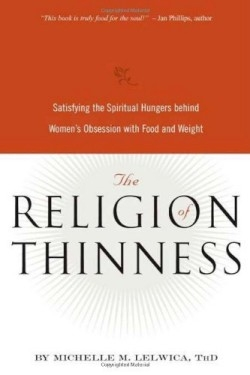The Religion of Thinness
Satisfying the Spiritual Hungers Behind Women's Obsession with Food and Weight
According to recent studies, more than three-quarters of healthy-weight adult women in the U.S. believe they are “too fat,” and nearly two-thirds of high school girls are on diets. In other words, says Michelle Lelwica, even healthy women are negatively preoccupied with weight. While the statistics are startling, they are hardly news. What is new in The Religion of Thinness is Lewica’s framing of weight issues within a discussion of spirituality. Women’s quest for thinness has become a religion. Instead of finding fulfillment and meaning through this religion, however, women find only self-destruction and self-loathing.
Lelwica has a doctorate in theology from Harvard, teaches religion at Concordia College, and is author of the book Starving for Salvation. Using her expertise as religious scholar and cultural critic, she illustrates how the pursuit of thinness possesses the components of a religion. Lelwica doesn’t want readers to merely observe the parallels between worshipping a deity and worshipping thinness, however; she wants readers to learn to correct culturally poisoned behavior and to find personal satisfaction through other means. The myths, rituals, images, and moral codes of the religion of thinness are explored, and readers are encouraged to think critically about these elements and practice more mindful behaviors.
The book’s primary audience is women, but because of its larger social, cultural, and media criticism, it appeals to both male and female readers. It is written in straight-forward prose, and the tone, while serious, is open and comforting. The organization of ideas and material is logical, and while the author does repeat her key ideas for emphasis, the repetition serves to remind rather than distract.
Clearly, Lelwica’s hopes to turn around the statistics with which she begins the book; The Religion of Thinness helps to wake readers to thinness’ false promises, and it pushes them to seek a salvation built on more solid ground.
Disclosure: This article is not an endorsement, but a review. The publisher of this book provided free copies of the book to have their book reviewed by a professional reviewer. No fee was paid by the publisher for this review. Foreword Reviews only recommends books that we love. Foreword Magazine, Inc. is disclosing this in accordance with the Federal Trade Commission’s 16 CFR, Part 255.

